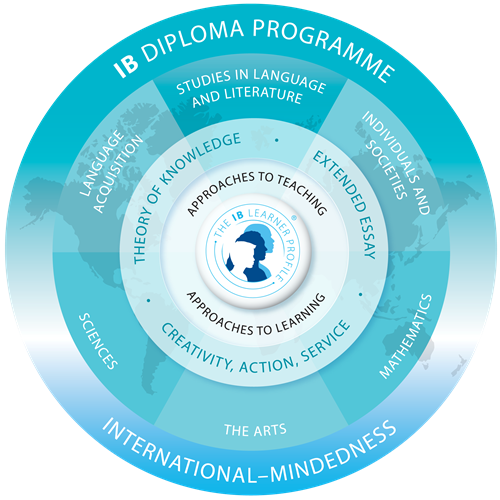- Murrieta Valley High
- The Curriculum
International Baccalaureate
-
The Curriculum
IB Diploma Program students study six courses at higher level or standard level. Students must choose one subject from each of groups 1 to 5. Taking courses across all five subject groups ensures breadth of experience in languages, social studies, experimental sciences and mathematics.The sixth subject may be an arts subject from group 6, or the student may choose another course from groups 1 to 5.Students can take a minimum of 3 but a maximum of 4 higher level courses (240 teaching hours), and a minimum of 2 but a maximum of 3 standard level courses (150 teaching hours). Students are only allowed two standard level exams their junior year, all other exams must be in their senior year.Students also have to complete the core requirements, which include: an Extended Essay, a Theory of Knowledge course, and Creativity, Activity, and Service. These additional requirements exempt students from the MV graduation requirements of the junior reflective essay and senior exit interview.
The Core Curriculum
EXTENDED ESSAY (EE)- Independent, self-directed research on a topic of student's choice. Students design a question that they then argue with research.
-
Familiarizes students with the independent research and writing skills expected at university.
-
Students are supported throughout the process by a supervisor at the school.
-
Maximum of 4000 words - approximately 12 to 14 pages, written over the two years of the program.
THEORY OF KNOWLEDGE (TOK)-
One of the most exciting courses to the program! An interdisciplinary course that challenges students to ask why and how we know what we know, and explore where knowledge comes from.
-
One year course taken in Spring semester of 11th grade and Fall semester of 12th grade.
-
Group presentation and essay requirement.
CREATIVITY, ACTIVITY, SERVICE (CAS)-
The CAS component raises students' awareness of community needs both locally and globally and builds confidence in their ability to bring about change.
-
Creativity includes arts activities, and designing and implementing service projects.
-
Action includes physical activities and exercise, such as playing sports, dance, etc.
-
Service encompasses community and social service activities both locally and globally.
Internal Assessment
Students complete internal exams within the classroom. These exams are marked by the student’s teacher and then moderated by external IB examiners. Internal assessments vary by subject, but can include oral presentations, in-class essays, replication of experiments, lab reports, research papers, and oral interviews.
External Assessment
The IB Diploma Program students take written exams in May at the end of each course. All students in a higher level course, which is a two year course, will have exams in May of their senior year. These exams are marked (graded) by external IB examiners.Students are awarded marks (scores) for each course based on their performance on both the external exams in May and their internal exams throughout the year. The marks range from 1 (lowest) to 7 (highest).
Last Modified on January 25, 2019

